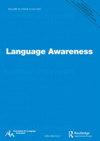教师教育中批判性多语语言意识的出现:经验和课程的作用
IF 2.2
2区 文学
0 LANGUAGE & LINGUISTICS
引用次数: 0
摘要
摘要为了让未来的教师更好地为日益多样化的学生群体做好准备,教师教育项目将关键的语言意识框架整合到他们的课程中。然而,关于此类课程对教师批判性多语意识影响的研究却很少。鉴于培养教师的批判性多语言意识(CMLA)的重要性,本案例研究探讨了经验和课程对美国中西部一所大型大学的新语言教师教育者和职前教师新兴的CMLA的影响。它衡量教师对五个CMLA领域(认知、社会、情感、绩效和权力)的不断发展的意识,特别关注权力领域。基于对访谈和课程工件数据的迭代和递归定性分析,本研究表明教师能够通过课程作业开发CMLA,特别是如果他们能够将其与个人经历联系起来。此外,对语言的权力领域的深刻理解建立在(1)对cmla的其他领域的认识,特别是情感和社会领域,以及(2)这些领域影响英语学习者公平获得教育机会的方式。摘要(中文)针对语言越发多元化的中小学学生群体,教师教育项目致力于更好地培养职前教师,因而开始在课程中融入与批判性语言意识相关的知识框架。“”“”“”“”“”“”“”“”。鉴于培养老师CMLA的重要性,本文所描述的研究探索个人经历及课程内容对一名职前语言教师教育者以及一名职前教师的已萌芽的CMLA的影响。此研究的数据搜集于一所美国中西部大学的教师教育项目。本研究衡量了教师对CMLA五个维度(认知的,社会的,情感的,表现的,及权力的)的不断发展的认识,且集中探讨权力这一维度。通过一系列对采访与课程资料数据的迭代的和递归的质化分析,本研究展示了通过教师教育课程发展教师CMLA的可能性,尤其是当课程内容与教师的个人经历建立关联。此外,教师对语言的权力维度更深层次的认识建立于(1)对CMLA其他维度的认识,尤其是情感和社会维度;(2)对这些维度如何影响英语学习者得到的教育公平和教育机会的认识。职前教师和在职教师往往难以制定教学实践,以维持多语言和多元文化学习者带入课堂的多样化语言。如果教师是白人,只说一种语言,英语占主导地位,几乎没有与少数族裔学生打交道的经验,那么这个问题就会被放大。为了更好地理解我们如何才能更好地培养多语言学习者对现有语言资源的更大认识,我们追踪了一位职前教师对语言批判意识的发展,以及她从一位新教师教育工作者那里得到的支持。借鉴Prasad和Lory的教师关键多语言意识(CMLA)框架领域,该框架考虑了权力在五个领域(认知、情感、社会、表现和权力)的总体影响,我们探索了(1)我们的参与者如何在以翻译语言为重点的英语教师教育实践课程中解释权力,以及(2)权力问题如何在课程中表现出来。我们的访谈和课程工件数据表明,教师能够通过课程作业开发CMLA,特别是如果他们能够将其与个人经历联系起来。我们还认为,对语言的权力领域的深刻理解建立在(1)对cmla的其他领域的认识,特别是情感和社会领域,以及(2)这些领域影响英语学习者公平获得教育机会的方式。论文最后呼吁将CMLA作为课程设计的核心框架,作为补充以公正为导向的译语教学法的手段。关键词:批判性多语言意识;外语教师教育;职前教师权力;开放奖学金本文通过开放实践披露获得了开放材料中心的徽章。数据和材料可在https://jstagedata.jst.go.jp/上公开获取。如欲获取作者披露表,请与编辑联系。注1此外,职前教师还选修了人类学系的一门语言学课程和一门语言与文化课程,这两门课程都不是专门为语言教师设计的该研究得到了进行研究的大学机构审查委员会的批准(STUDY00005629)。本文章由计算机程序翻译,如有差异,请以英文原文为准。
The emergence of critical multilingual language awareness in teacher education: the role of experience and coursework
AbstractTo better prepare future teachers for an increasingly linguistically diverse student population, teacher education programs have integrated critical language awareness frameworks into their coursework. However, research on the influence of such coursework on teachers’ critical multilingual awareness is scarce. Given the importance of developing teachers’ critical multilingual language awareness (CMLA), this case study explores the impact of experience and course work on a novice language teacher educator and a pre-service teacher’s emerging CMLA at a large Midwestern U.S. university. It gauges teachers’ evolving awareness of the five CMLA domains (cognitive, social, affective, performance and power), with a particular focus on the power domain. Based on an iterative and recursive qualitative analysis of interview and course artifact data, this study shows that teachers are able to develop CMLA through coursework, especially if they are able to link it to personal experiences. Furthermore, a deep understanding of the power domain of language builds on (1) an awareness of the other domains of CMLA—in particular the affective and social domains—and (2) the ways these domains impact English learners’ equitable access to educational opportunities.ABSTRACT (MANDARIN) 针对语言越发多元化的中小学学生群体, 教师教育项目致力于更好地培养职前教师, 因而开始在课程中融入与批判性语言意识相关的知识框架。然而, 目前研究很少涉足这类课程如何影响教师的批判性多语语言意识(CMLA)的发展。鉴于培养老师CMLA的重要性, 本文所描述的研究探索个人经历及课程内容对一名职前语言教师教育者以及一名职前教师的已萌芽的CMLA的影响。此研究的数据搜集于一所美国中西部大学的教师教育项目。本研究衡量了教师对CMLA五个维度(认知的, 社会的, 情感的, 表现的, 及权力的)的不断发展的认识, 且集中探讨权力这一维度。通过一系列对采访与课程资料数据的迭代的和递归的质化分析, 本研究展示了通过教师教育课程发展教师CMLA的可能性, 尤其是当课程内容与教师的个人经历建立关联。此外, 教师对语言的权力维度更深层次的认识建立于(1)对CMLA其他维度的认识, 尤其是情感和社会维度;(2)对这些维度如何影响英语学习者得到的教育公平和教育机会的认识。PLAIN LANGUAGE SUMMARYPre-service and in-service teachers often struggle to enact pedagogical practices that sustain the diverse languages that multilingual and multicultural learners bring into the classroom. This problem is amplified when the teachers are white monolingual, English-dominant speaking individuals with little experience working with minoritized students. To better understand how we might be better able to foster greater awareness of multilingual learners’ existing language resources, we traced the development of a pre-service teacher’s critical awareness of language alongside the support she received from a novice teacher educator. Drawing upon Prasad and Lory’s Domains of Critical Multilingual Language Awareness (CMLA) Framework for Teachers, which considers the overarching influence of power across five domains (cognitive, affective, social, performance and power), we explored (1) how both our participants interpreted power in an English language teacher education practicum course that focused on translanguaging, and (2) how power issues were manifested in the coursework. Our interview and course artifact data suggest that teachers are able to develop CMLA through coursework, especially if they are able to link it to personal experiences. We also argue that a deep understanding of the power domain of language builds on (1) an awareness of the other domains of CMLA—in particular the affective and social domains—and (2) the ways these domains impact English learners’ equitable access to educational opportunities. The paper closes with a call to integrate CMLA as a central framework for curricular design as a means of complementing a justice-oriented translanguaging pedagogy.Keywords: Critical multilingual awarenesstranslanguagingteacher educationpre-service teacherspower Open ScholarshipThis article has earned the Center for Open Science badges for Open Materials through Open Practices Disclosure. The data and materials are openly accessible at https://jstagedata.jst.go.jp/. To obtain the author's disclosure form, please contact the Editor.Disclosure statementNo potential conflict of interest was reported by the author(s)Notes1 In addition, the pre-service teachers take one linguistics course and one course on language and culture from the anthropology department, both of which are not designed particularly for language teachers.2 The study was approved by the Institutional Review Board of the University where the study took place (STUDY00005629).
求助全文
通过发布文献求助,成功后即可免费获取论文全文。
去求助
来源期刊

Language Awareness
Multiple-
CiteScore
3.70
自引率
10.00%
发文量
18
期刊介绍:
Language Awareness encourages and disseminates work which explores the following: the role of explicit knowledge about language in the process of language learning; the role that such explicit knowledge about language plays in language teaching and how such knowledge can best be mediated by teachers; the role of explicit knowledge about language in language use: e.g. sensitivity to bias in language, manipulative aspects of language, literary use of language. It is also a goal of Language Awareness to encourage the establishment of bridges between the language sciences and other disciplines within or outside educational contexts.
 求助内容:
求助内容: 应助结果提醒方式:
应助结果提醒方式:


